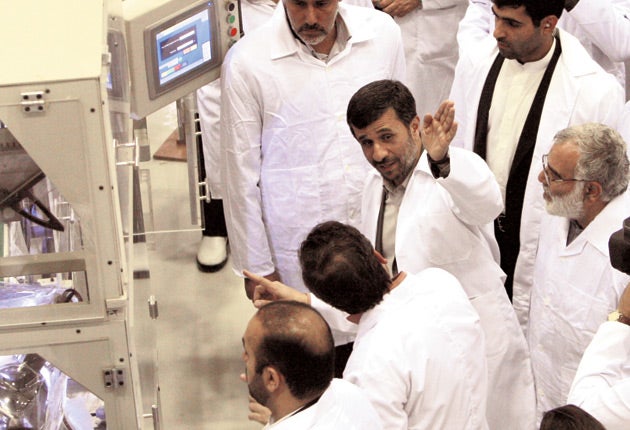Iran issues nuclear rebuff to US
Ahmedinejad remains defiant despite Obama's peaceful overtures

The Obama administration's latest diplomatic overtures to Iran have suffered an initial rebuff, as Tehran yesterday announced advances in its controversial nuclear programme and confirmed that a detained American journalist would be charged with spying.
Just 24 hours after Hillary Clinton, the Secretary of State, declared the US would take part directly in talks to persuade Iran to drop its suspected plan to develop a nuclear weapon, Iran responded by claiming the number of centrifuges at its uranium enrichment facility had risen from 6,000 to 7,000 – an increase that many Western analysts and Israel fear brings closer the day when Tehran will have enough weapon-grade uranium for a bomb.
At the same time, President Mahmoud Ahmedinejad formally opened Iran's first nuclear fuel product plant in Isfahan, ostensibly to produce uranium oxide for a heavy-water reactor in the city of Arak, 160 miles south-west of Tehran, when it is finished in the next three or four years.
However, some experts believe the facility could be part of a parallel weapons programme that would allow Iran to produce plutonium for two nuclear weapons a year, should it decide to separate the plutonium from the reactor's spent fuel.
In his speech, Mr Ahmedinejad said Tehran was ready to take part in talks over its nuclear programme, but only if the negotiations were based on "justice and respecting rights". That last condition is a reiteration of Iran's longstanding position that, while it denies seeking nuclear weapons, it has every right as a signatory of the nuclear non- proliferation treaty to pursue its own peaceful nuclear programme.
Mrs Clinton's declaration that Washington would "from now on" take part fully in the nuclear talks between Iran and the five permanent members of the UN Security Council, plus Germany, marks a sharp break with the Bush administration, which had virtually no truck with Iran after it labelled it a member of the "axis of evil" in 2002.
Mrs Clinton said the US believed that "very careful engagement" with Iran "on a range of issues that affect our interests and the interests of the world" made sense. Nothing was more important than persuading Iran to cease its efforts to obtain a nuclear weapon, she added.
But at the very least, Mr Ahmedinejad is playing hard to get. Yesterday's speech may have been part of a diplomatic minuet influenced by the upcoming presidential elections in Iran and the fact that it was delivered on his country's official Nuclear Day.
But it sent little signal of a shift in policy, which has seen Tehran turn down offers of incentives to stop reprocessing and enriching uranium, continuing regardless, despite three rounds of UN sanctions.
In another sign that Iran will not back down lightly, the authorities have said that Roxana Saberi will go on trial next week charged with espionage.
Ms Saberi, a journalist with dual American and Iranian citizenship who has reported for several news organisations including the BBC and National Public Radio, was arrested two months ago. Both she and the US government flatly deny the charges that she is a spy working for the US.
Nonetheless, any trial will only complicate Washington's efforts to engage Iran seriously for the first time since it broke off diplomatic relations after militants took 66 Americans hostage at the US embassy in Tehran in 1979.
Some contact between the two countries has taken place over Afghanistan, most recently at last month's international conference on Afghanistan in The Hague, attended by Mrs Clinton and Iranian representatives.
But President Obama, has served notice he wants to go much further. In March he sent a personal video address to the Iranian people, referring to the country as "The Islamic Republic" and offering an end to years of stand-off if Iran softened the bellicose rhetoric for which Mr Ahmedinejad is notorious.
Join our commenting forum
Join thought-provoking conversations, follow other Independent readers and see their replies
Comments
Bookmark popover
Removed from bookmarks